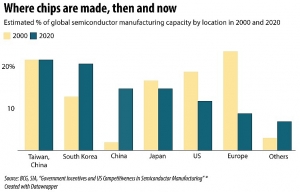Vietnamese telecoms giants grappling with chip shortfall
At present, leaders of Vietnam Posts and Telecommunications Group (VNPT), the top provider of telecommunications services and digital solutions in Vietnam, are attempting to shelter from the storm of semiconductor chip shortfall and the ongoing negative pandemic impacts.
 |
| MobiFone knows that just sticking to traditional business strategies will not cut it going forward, Le Toan |
General director Huynh Quang Liem explained that while COVID-19’s direct impact on the group’s performance has not been as serious as in 2021, many of its business activities still face difficulties that will possibly affect the company’s revenue and profit targets for 2022 as a whole.
Together with interruptions in the global supply chains, shortages of semiconductor chips, and a rise in input material prices, service fees have fallen, which are also affecting business results for VNPT.
The group reported that its consolidated profit rose 17 per cent on-year in the first six months of 2022, but consolidated revenues of VND26.8 trillion ($1.17 billion) are down 2 per cent on-year.
VNPT’s core business lines and sectors include fixed and mobile telecommunications, broadband internet access, satellite communication services, and digital services and solutions for governments, businesses, and citizens.
In a similar situation, MobiFone reported an on-year fall of 3 per cent in revenues during the period, while profits increased 13 per cent.
MobiFone leaders admitted that, like similar groups, they face many challenges with revenues and profits from traditional businesses decreasing. Meanwhile, it still lags behind other players in new services and business lines that have the potential to create new financial sources.
MobiFone now focuses on the three core business lines of digital infrastructure, digital solutions/platforms, and digital content services.
Hoang Viet Tien, head of Strategic Advisory at Insider Group - a provider of marketing technology solutions, told VIR, “The Ukraine-Russia conflict has been affecting telecoms firms, especially operators of base transceiver stations (BTS) and developers and providers of sensors for smart cities development.”
Viettel is operating about 1,000 BTS nationwide, while partnering with a number of cities and provinces in the development of smart cities. To date, 41 out of 63 localities have been building their smart city development plans. VNPT is also providing IT solutions for smart city development, and also operates thousands of BTS throughout the country.
Industry insiders said that the conflict in Europe is adding pressure to the global chipset manufacturing industry because the rare gas supply important for manufacturing is being tightened, increasing interruption in the manufacturing of semiconductors which was already seriously affected by pandemic restrictions. Ukraine typically supplies well over half of the world’s neon gas, which is an indispensable by-product for chip production.
Qualcomm, the world’s biggest supplier of smartphone chips, admitted the situation is a struggle. Many other US chip producers, including Intel, said that the situation will continue into 2023. Qualcomm is an important partner of Viettel, VNPT, and other telecom firms in Vietnam. For instance, Qualcomm and Viettel are cooperating to develop 5G infrastructure solutions.
Despite the challenges in the chip supply, Vietnamese tech giants are setting higher business results for 2022. In particular, VNPT aims to fetch a revenue of VND41.45 trillion ($1.8 billion) and a pre-tax profit of VND4.77 trillion ($207.39 million) this year.
Meanwhile, this year is a key one for MobiFone to start its new space service businesses. The parent company targets to make revenues of over VND30 trillion ($1.3 billion), and an on-year rise of 15 per cent in profit.
Viettel has retained the number-one position in the telecoms market with 54 per cent of the share of mobile subscribers, and over 40 per cent of optic internet subscribers.
 | Automobile sales down 42 per cent on chip shortage The Vietnam Automobile Manufacturers’ Association (VAMA) has announced that its members sold 25,159 vehicles in June, down 42 per cent from May ending three consecutive months of gains. |
 | Samsung eyes Texas for chip-making plant Electronics giant Samsung is considering the US state of Texas as a possible location for a new $17 billion chip-making plant, according to filings with state officials. |
 | Manufacturers localise supply to circumvent chip shortages A global chip shortage is creating more pressure for manufacturers in Vietnam as they deal with slowed-down production for electronics and tech products, while local and overseas players are racing to prepare new premises for the production of much-needed supply. |
| Escaping the depths of the semiconductor chip shortage The semiconductor chip shortage, a deteriorating supply chain issue affecting businesses all across the world, shows no signs of abating anytime soon. Meir Tlebalde, associate director cum head of Real Estate M&A, Deal Advisory at KPMG Vietnam, explained more to VIR’s Thanh Van about the impact for Vietnam. |
| Indonesia gears towards self-reliance in semiconductor chips Indonesian Industry Minister Agus Gumiwang Kartasasmita said on August 31 that the country is moving towards self-producing semiconductor chip products, in line with the government's goal of reducing dependence on import. |
 | Samsung marks its first shipment of cutting-edge 3nm chips Samsung Electronics Co. has organised a ceremony on July 25 to celebrate the first shipment of 3-nanometer semiconductors, marking an important milestone in the race to develop the most advanced and efficient chip in the market. |
What the stars mean:
★ Poor ★ ★ Promising ★★★ Good ★★★★ Very good ★★★★★ Exceptional
Themes: Digital Transformation
- Dassault Systèmes and Nvidia to build platform powering virtual twins
- Sci-tech sector sees January revenue growth of 23 per cent
- Advanced semiconductor testing and packaging plant to become operational in 2027
- BIM and ISO 19650 seen as key to improving project efficiency
- Viettel starts construction of semiconductor chip production plant
Related Contents
Latest News
More News
- A golden time to shine within ASEAN (February 19, 2026 | 20:22)
- Vietnam’s pivotal year for advancing sustainability (February 19, 2026 | 08:44)
- Strengthening the core role of industry and trade (February 19, 2026 | 08:35)
- Future orientations for healthcare improvements (February 19, 2026 | 08:29)
- Infrastructure orientations suitable for a new chapter (February 19, 2026 | 08:15)
- Innovation breakthroughs that can elevate the nation (February 19, 2026 | 08:08)
- ABB Robotics hosts SOMA Value Provider Conference in Vietnam (February 19, 2026 | 08:00)
- Entire financial sector steps firmly into a new spring (February 17, 2026 | 13:40)
- Digital security fundamental for better and faster decision-making (February 13, 2026 | 10:50)
- Aircraft makers urge out-the-box thinking (February 13, 2026 | 10:39)

 Tag:
Tag:
















 Mobile Version
Mobile Version